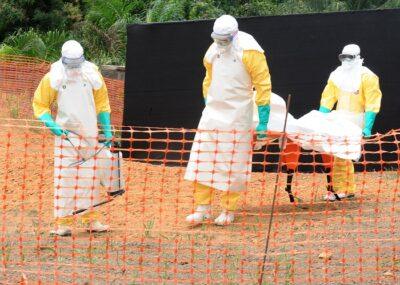|
Listen To The Article
|

Image source: NBC News
Like many Americans, I am concerned about Ebola. And as a health care provider who regularly cares for seriously ill and dying patients who require specialized isolation procedures, I am very interested in ensuring the safety of the public, patients, fellow care providers and myself.
Since there are no approved conventional cures for Ebola, I researched whether natural remedies had any place in the fight against it.
The Food and Drug Administration (FDA) recently cautioned some essential oil companies in the United States for making claims about the efficacy of essential oils for the prevention and/or treatment of Ebola. They also warned a company which sells colloidal silver about making Ebola-related claims.
Sadly, whenever serious illnesses arise, whether out of a lack of knowledge, genuine good intentions or greed, many companies do make unsubstantiated claims. These types of claims hurt the natural products industry and indirectly make effective natural remedies less available. A Nigerian company purported the use of salt water as a cure for Ebola. Two people died from the “treatment.”
Do Essential Oils Prevent and Cure Ebola?
Many essential oils inhibit or destroy microorganisms, such as viruses, fungi and bacteria. Essential oils probably do have some action upon the Ebola virus; however, that does not mean that they are useful for the treatment or cure of it. Even if a virus is destroyed in a test tube when it comes into contact with an essential oil, it does not mean that a safe concentration can be used to treat a person.
The Hidden Secrets Of Making Herbal Medicines…Right At Your Fingertips!
While cinnamon oil is receiving the most attention, many other oils have antiviral effects. More research is needed. That said, a few drops of cinnamon, thyme, oregano or other essential oils may be beneficial for the general prevention of the spread of microorganisms.
Essential oils are extremely concentrated. Keep them out of reach of children and dilute them as directed. Learn as much as you can about any oil that you plan to use. Allergic and other reactions may occur.
Are Herbs Useful in the Fight Against Ebola?
One of the most difficult challenges in treating Ebola is the fact that it is a new virus, having first been identified in 1976. There are five known strains of the virus, four of which infect humans. As a new virus, there is no long-term history of using traditional medicines to prevent and treat Ebola. Again, the problem is that we simply do not know.
Some traditional medicine practitioners and health officials in Africa have stated that ashwaghandha and jute have cured patients suffering from Ebola. No reliable studies back up these claims.
Biopharming and Ebola
Biopharming is the use of plants to produce genetically altered compounds. These substances may be used to treat diseases. For example, biopharming may be useful in treating multidrug resistant organisms. The experimental drug ZMapp is produced by biopharming.
ZMapp has been used to treat a handful of Ebola patients, but has not been successful in all cases. Out of seven patients, two died.
ZMapp is produced using a wild tobacco which grows in Australia. The plant itself does not cure Ebola, but is used as a host to grow antibodies which fight Ebola. ZMapp is only entering stage 1 clinical trials, which means that even if the drug is effective, widespread availability is a long way away.
Ebola and Natural Remedies: The Bottom Line
I believe natural remedies are underused and will be proven to be useful in the treatment of Ebola. Most current treatments for Ebola, though, are supportive therapies, such as managing symptoms and ensuring that patients are hydrated. Natural remedies, though, are underused as supportive treatments. For example, herbs may be employed to reduce fever, control diarrhea and provide nutrition. Essential oils may provide comfort and improve air quality in hospital rooms, and would be useful additions to products used to sanitize sick rooms.
Caution and commonsense must lead the way in controlling and eradicating this horrible virus. Unfortunately, politics, big business and layers of red tape may slow the process of finding a cure. Even when it is found, resources are likely to be limited, especially in the countries where the virus is most prevalent.
It is easy to panic when hearing about Ebola. Fortunately, Ebola is not easily spread. The CDC says you can only catch Ebola by direct contact with the blood and the body fluids of a sick person who has symptoms of Ebola. Symptoms appear between 2-21 days after contact. Fever, diarrhea, weakness, bleeding and muscle pains are commonly experienced among Ebola patients.
Do you believe natural products can treat or even cure Ebola? Leave your reply in the section below:
 Off The Grid News Better Ideas For Off The Grid Living
Off The Grid News Better Ideas For Off The Grid Living




